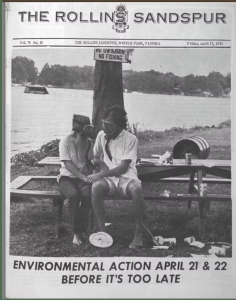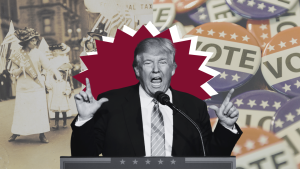Every four years, those of us who don’t mind political pageantry tune in to a relatively new U.S. tradition: the big presidential debate. The first official debate wasn’t until 1960, when John F. Kennedy and Richard Nixon squared off, unless you count when Eleanor Roosevelt and Margaret Chase Smith stood in for candidates Adlai Stevenson and Dwight Eisenhower. Even then, 16 years passed before the next debate—early candidates in this country thought it unbecoming to campaign, much less to debate publicly.
Over the last decade, it seems every debate has had one common factor: Donald Trump. College-aged kids may vaguely recall the Obama-Romney debate back in 2012 but the 2016, 2020, and now 2024 debates have been suffused with Trump’s extreme rhetoric and often untenable assertions—immigrants eating pets, for example. Let’s just say real time fact-checking and muted mics have not always been the norm, though they seemed necessary for Vice President Kamala Harris’ first meeting with former President Trump on September 10.
The Rollins Democracy Project held a viewing party for the occasion, complete with debate bingo and coloring sheets of donkeys and elephants. Nearly 100 students attended the event in Dave’s Boathouse.
Stella Bronwyn Morris (‘26), Democracy Project Coordinator, said “People were quite literally glued to the screen the other night… students are ready to vote. They’re getting registered. In the last two weeks, the Democracy Project has registered over 50 students to vote. People have their plans in place. I’ve never received so many questions about mail-in ballots.”
There were several notable moments from the debate night:
Harris initiated a handshake with Trump, introducing herself with: “Kamala Harris, let’s have a good debate.” Some stipulate she placed extra emphasis on the pronunciation of “KAmala.”
Trump at one point claimed that Harris “wants to do transgender operations on illegal aliens that are in prison.” He was referring to a 2019 questionnaire she filled out that asked if she would use executive authority to give transgender and nonbinary people, including prisoners and immigrants, access to comprehensive treatment.
Harris passionately asserted: “These dictators and autocrats are rooting for you to be president again, because they’re so clear, they can manipulate you with flattery and favors.” Harris’s case became more forceful and fierier as Trump referred to Biden as “her boss” and went as far as to say, “I’ll give you a little secret: [Biden] hates her. He can’t stand her.”
Though Harris did not engage with these pointed remarks, she had calculated responses to questions on the issues of abortion, the border crisis, and the events of Jan. 6. She stated, “when you then talk in this way in a presidential debate and deny what over and over again are court cases you have lost — because you did in fact lose that election — it leads one to believe that perhaps we do not have in the candidate to my right the temperament or the ability to not be confused about fact. That’s deeply troubling. And the American people deserve better.”
Like every good media hoopla, there must be a winner. A YouGov poll of registered voters determined that to viewers, Harris won this debate by 54-31 percent.
To many, Taylor Swift’s endorsement, signed “childless cat lady” was the cherry on top—as Harris left the stage of her debate watch party at the Cherry Street Pier in Philadelphia, Swift’s song “The Man” was playing through the speakers. One day later, Swift’s endorsement post amassed over 10 million likes.
Trump had posted AI-generated images of Swift endorsing him, prompting her to write, “I’m voting for @kamalaharris because she fights for the rights and causes I believe need a warrior to champion them … I was so heartened and impressed by her selection of running mate @timwalz, who has been standing up for LGBTQ+ rights, IVF, and a woman’s right to her own body for decades. I’ve done my research, and I’ve made my choice. Your research is all yours to do, and the choice is yours to make.”
Vanity Fair said the endorsement caused a “donation windfall,” as the political organizing group “Swifties for Kamala” (not officially affiliated with Swift), has raised $158,000 for the Harris campaign as well as hosted a kickoff event where Carole King rapped “Shake It Off” and Elizabeth Warren was a keynote speaker.
Whether Swift influences voters or not, she certainly ruffled some feathers. Elon Musk tweeted: “Fine Taylor … you win … I will give you a child and guard your cats with my life.”
A sullen post-debate Trump told Fox & Friends: “… I was not a Taylor Swift fan.” Despite past instances of support for the singer, the former president was quick to revoke any possible Swift championing.
The Harris campaign, on the other hand, has put “Harris-Walz” friendship bracelets for sale in their official store, writing “Are you ready for it?” at the top of the page. The presale bracelets were sold out in less than 24 hours.
But besides all the showbiz fuss, is there any evidence that debates have an influence on the outcomes of Presidential elections?
Research from Harvard Business School says in a 2019 article that “72 percent of voters make up their minds more than two months before the election, often before candidates square off. And those who shift to a different candidate closer to the election don’t do it following TV debates.” Another study by University of Missouri Professors analyzed undergraduate responses to debates between 2000 and 2012—they found that 3.5 percent of respondents switched candidates and 7 percent of undecided respondents came to a decision.
Though these numbers are hardly dramatic, the circumstances of the 2024 election are also hardly standard; perhaps this event holds more weight than previous research can predict.
President Joe Biden was pressured by counterparts in the Democratic party to step aside from his candidacy when his debate performance was poorly received in June, so we know that debates clearly can have an impact on party support.
After the June fallout sent the party into an erratic frenzy, Governor Tim Walz of Minnesota, Harris’ VP running mate, spoke out in support of Biden to journalist Amna Navaz on the PBS Newshour.
“The totality of the president’s work, especially at the crisis time coming out of COVID and some of the things, as a governor, we’re at the tip of that spear and we see it. So I don’t think you judge a person’s — their body of their work on one night,” he said.
Walz questioned how viewers could diagnose Trump as the “winner” of the June debate when he was articulate in “a terrifying message” of destroying women’s reproductive rights and having no intention of helping working class people.
On debating itself, the governor told Navaz, “I don’t think they’re real life. I think they’re performative. I think way too much emphasis is put on them, because it’s the governing, it’s the record, and it’s the delivering of the things that make a difference. So I’m in no rush to ever do them.”
Despite his statement back in June, Walz has agreed to go head-to-head with Senator J.D. Vance in the Oct. 1 CBS vice presidential debate. The Democracy Project has yet to publicly announce a debate party for the occasion, but after the success of Tuesday’s event and their diligence in registering voters, it only seems appropriate.
“I hear a lot of my peers say their voice doesn’t matter, and I can’t combat that lie enough,” says Morris (‘26).
“Your voice DOES matter. People in power wouldn’t be trying to make it so difficult for you to vote if your vote didn’t matter. Gen Z is such a massive proportion of the U.S. population now that we actually have the numbers to tip an election one way or another. So please—register. Educate yourself. Take action: vote. Democracy is counting on us.”
Take it from Miss Americana’s lyrics: “They aren’t gonna change this—We gotta do it ourselves.”
The opinions on this page do not necessarily reflect those of The Sandspur or Rollins College. Have any additional tips or opinions? Send us your response. We want to hear your voice.
















Comments are closed.